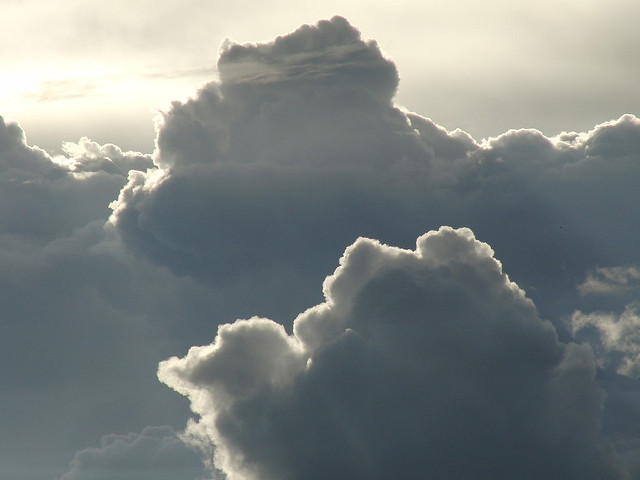
Practicing the Power of Reflection
I have practiced the power of reflection the longest by watching clouds in the sky.
Other methods have developed over time. There are times when listening to certain music, in certain ways, can help. Watching a fire in a fireplace or an outdoor campfire often works. Sometimes the waves of the ocean or a nice rain inspire my practice.
There have been times when meaningful conversations sparked my reflection. Rocking chairs can be powerful tools for reflection.
The earliest reflection I can remember, though, came while watching clouds overhead.
Clouds’ ability to move and change their shapes help distract me from my distractions.
It is not about reading them to determine what the weather is going to be. Clouds can talk to us without necessarily communicating specific information.
There is just something reflective about lying on our backs in the grass looking up at the clouds passing overhead.
Our imaginations recognize things in the shapes of the clouds and we reflect on what they all mean.
We feel the power of reflection more clearly when the clouds are not in a hurry, not being driven by strong winds. Clouds float along and our thoughts float with them.
It can feel like we lose our ability to watch clouds well as we gain responsibilities. We allow everything we need to do and what other people expect of us to get in our way.
It can be easy for us to forget about the power of reflection.
There is less and less time for clouds or fires or rocking chairs as we fill our lives with things to do. We spend more and more time thinking and less and less time reflecting.
Clouds are transformed from sparks for our imaginations into things which block the sun.
What is the Power of Reflection?
We become accustomed to constantly being analytical. Given a problem, we figure out an answer. We may be comfortable being emotional. Situations or relationships bring our strong feelings to the surface immediately.
Reflection allows us to go longer and deeper. Reflecting is about the themes and values behind or underneath what we do and who we are.
Spending time in reflection is not about mastering what we find. It is more about recognizing how the underlying reasons of our lives master us.
I learned much more about thinking than about reflection as a child. Whether in school, at church, or even at home, life was about figuring out the right answer.
Learning about reflection has taken me more time and effort later in my life.
Reflecting, like listening, is something we practice. We begin reflecting before we really know what reflection is, how it works. As we spend time practicing reflection, we begin to understand.
As we begin, reflection can feel like we are not really doing anything. Like listening, it can appear, even to us, we are being passive. Reflection is like listening, though we are listening to something deeper than words.
The power of reflection slowly builds strength within us.
As we start small, practicing short periods of reflection, it expands within us. Reflection reveals us to ourselves.
There is time for reflection built into each monastic day. As they practice reflection, monks come to see its importance. The power of reflection draws us below the surface, deeper than our initial responses. Gradually, over time, practicing reflection allows us to see our truer, deeper selves more clearly.
It takes time for the power of reflection to grow in us. Like listening, we need to practice reflection.
How Do We Practice the Power of Reflection?
We practice the power of reflection when we remember the experience of lying on our backs watching clouds. It was not a practice for which we scheduled a set amount of time each day. As we practiced reflecting with the help of the clouds, time seemed to stand still for us.
We took our time for reflection. Each image we saw reflected back to us grew into another, and then another. There was no limit to what we might see as we reflected.
Now we need to carve our schedules to allow time for reflection in the midst of responsibilities and expectations. We admit we need time for reflection but never seem to include it on our calendars. There never seems to be enough time to look up and watch the clouds.
Reflection is the mental equivalent of pausing to take a deep breath. We fill our lungs with fresh air, as much as we can, and let it back out into the world. Again and again we breathe in clean air and send what bothers us out into the air.
Our minds grow tired of thinking and thinking. We let them breathe freely to clear the cobwebs out of the corners.
Where Does the Power of Reflection Carry Us?
We can become stuck in our analytical, rational thinking. Working hard to solve problems and devise answers, we can get stuck trying to organize things. Our efforts to understand and find solutions can become overwhelming.
The power of reflection can help us see not everything is our responsibility. We are not required to exceed every expectation.
Our minds need time to watch fires or rock in chairs or watch clouds in the sky.
Some of the challenges we face will be beyond our ability to understand. We may need to escape from the details and experience the power of reflection.
There is more to life than just what we can organize, control, and understand. Listening to the waves or the rain or the stillness opens us to what is beyond what we know.
What do you see when you lie on the ground looking up at the clouds in the sky?
Where do the flames in the fireplace take you?
What do the sounds of the rain or of the ocean spark in you?
When will we experience the power of reflection this week?
How can we practice the power of reflection today?
[Image by mnsc]
Greg Richardson is a spiritual life mentor and leadership coach in Southern California. He is a recovering attorney and university professor, and a lay Oblate with New Camaldoli Hermitage near Big Sur, California. Greg’s website is StrategicMonk.com, and his email address is [email protected].












